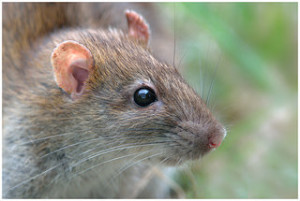Manage Food and Garbage to Manage Rats
By Chris Williams on August 10, 2015.
My son is living in a rather undesirable neighborhood that has a widespread rat problem. He’s seen rats both in the yard and once in the basement. He has roommates who are real slobs and he can’t get them to take out the garbage or clean up food scraps. Do you have a list of food and garbage handling guidelines that will help discourage rats?

Brown Rat
Sure do! You have reason to be concerned. Pest control experts say that there are probably about 10 rats in an area for each one seen at night. Besides eating and contaminating people foods, rats transmit diseases such as food poisoning and ratbite fever to people. They are often infested with lice, fleas, and mites that transmit other diseases. And if you feed them, they will come.
- Make sure garbage is tied off in bags kept in a heavy-duty container with a tight-fitting lid. Steel garbage cans are a better choice than plastic which rats can chew through.
- If rats, raccoons, or dogs tip over the garbage cans, either use a spring-loaded fastener or bungee cord to keep the lids on, or put the garbage cans on a platform that’s 18 inches above the ground and 3 feet away from buildings.
- Remove garbage from the residence daily, and before dusk, if at all possible.
- Clean garbage cans and recycling bins at least once a week.
- Store food, birdseed, compost, and recyclables in metal, glass, ceramic, or heavy-duty plastic containers with tight-fitting lids.
- Don’t leave pet food out beyond feeding time and store unfinished pet food in the refrigerator. Store bulk bags of dry pet food in a heavy-duty container with a tight-fitting lid, or store them on open wire shelves at least 18 inches off the ground.
- Keep kitchen counters, floors, and appliances wiped down and free of food crumbs, spillage, and grease.
- If possible, elevate the stove and refrigerator so they can be cleaned underneath. If they can’t be elevated, close off the bases so rats can’t get beneath them.
- Rake up and dispose of any fruits, nuts, or vegetables that are on the ground in the yard.
- Remove any pet feces in the yard or in litter boxes on a daily basis.
- Use baffles to keep rats (and squirrels) off of bird feeders. Clean up spilled seed under the feeders on a regular basis.
[Source: Best Practices for Nuisance Wildlife Control Operators: A Training Manual. NY State Dept. of Environmental Conservation, Cornell Extension, and NY State IPM Program. 2004]